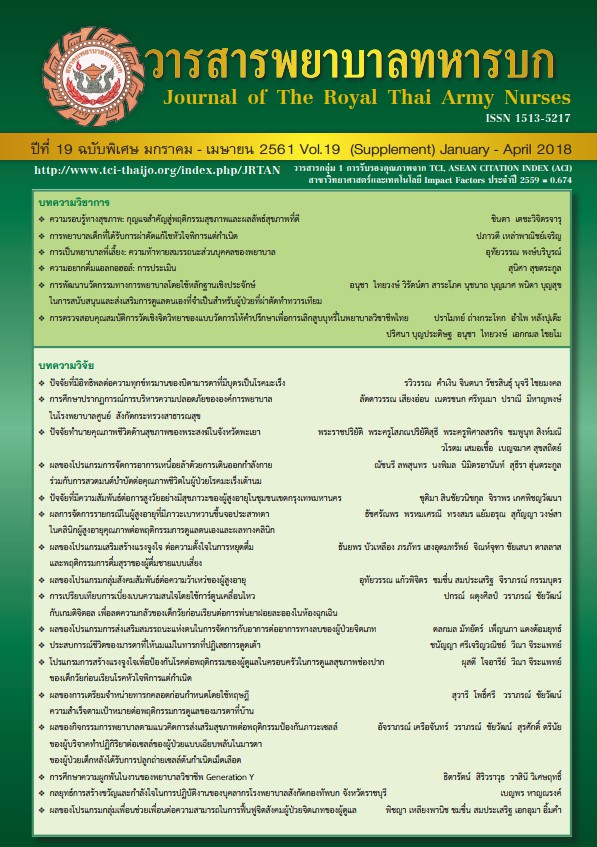The Effects of Multidisciplinary Collaborative Care Program on Depressive Prevention Amongst Diabetic Mellitus Type 2 Patients at a Secondary Level Hospital in Phetchaburi Province
Keywords:
Depressive prevention, Diabetic Mellitus type 2 patients, Collaborative care modelAbstract
This research was a quasi-experimental research, two group pretest - posttest design aimed to study the effects of multidisciplinary collaborative care program on depressive prevention amongst Diabetic Mellitus (DM) type 2 patients who had risk of depression.The total 36 subjects divided into 2 groups; 17 subjects for experimental group and 19 subjects for comparison group.The experimental group was invited to join in a 10-week multidisciplinary collaborative care program. This program consisted of participatory group learning, relaxation skill training, group counseling, and telephone visit monitoring. Data were collected using psychological self – care behavior and diabetes- related stress. The reliability were presented at 0.86 and 0.85 respectively.The Mann-Whitney U test and Wilcoxon Signed Rank test were used for data analysis. The research results revealed that after the intervention, the experimental group had significantly better psychological self – care behavior score than those before the experiment and than the comparison group. (p value < .05) while they had significantly lower the diabetes- related stress score than before experiment and in the comparison group. (p value < .05) The researcher suggested that the multidisciplinary collaborative care program was effectively improved psychological self – care behavior and decreased stress among the diabetic patients. This program should be used in integrating healthcare services for depressive
prevention in diabetic patients and other chronic diseases in other community hospitals.
Downloads
References
2. Rattarasarn CH. The outbreak of diabetes and the impact on Thailand. Bangkok: Novo Nordisk Pharma (Thailand) Ltd.; 2016. (in Thai)
3. The Emerging Risk Factors. Diabetes mellitus, fasting glucose, and risk of cause-specific death. N Engl J Med 2012;364:829-41.
4. Klungthumnium K, Wirojratana V, Jitramontree N, Pongthavornkamol K. The Relationships between illness representations, emotional representation and self - care behaviors in older persons with uncontrolled type 2 diabetes. Journal of The Royal Thai Army Nurses. 2016; 18(1):135-44. (in Thai)
5. American Diabetes Association. Economic cost of diabetes in the U.S. in 2012. Diabetes Care 2013;36:1033-46.
6. Rungreangkulkij S, Thavornpitak Y, Kittiwatanapaisan W, Kotnara I, Kaewjanta N. Prevalence and factors of depression among type 2 diabetic patients. J Psychiatr Assoc Thailand 2014;59(3):287-98. (in Thai)
7. Unnaphirak L, Ronnarithivichai CH, Thongcharoen V, Leelahakul V, Khumtaveeporn P. The pathophysiology in nursing. 8th ed. Bangkok: Faculty of Nursing Mahidol University; 2009. (in Thai)
8. Sittipornanan B. Committed suicide due to depression. Bangkok: Kaimo; 2007. (in Thai)
9. Lopes A, Perry IS, Bavaresco DV, Tuon L, Ceretta LB, Simões PW, Ribeiro RS. Association between major depression and type 2 diabetes mellitus: a Meta-analysis and meta-regression. Obs Stud 2016;9:103-52.
10. Department of Mental Health. Clinical practice guideline of psychosocial intervention for depressive disorder for psychiatric nurse in tertiary care. n.p.: 2011. (in Thai)
11. Egede LE, Ellis C. Diabetes and depression: Global perspectives. Diabetes Res Clin Pract 2010;87:302-12.
12. American Diabetes Association Standards of Medical Care in Diabetes. Classification and diagnosis of diabetes. Diabetes Care 2016;39: 13 - 22.
13. Unutzer J, Harbin H, Schoenbaum M, Druss B. The Collaborative care model: An Approach for Integrating Physical and Mental Health Care in Medicaid Health Homes. HEALTH HOME Information Resource Center 2013; 1-13.
14. Huang Y, Wei X, Wu T, Chen R, Guo, A. Collaborative care for patients with depression and diabetes mellitus: a systematic review and metaanalysis.
BMC Psychiatry 2013;13:260-71.
15. Akwarangkoon S. Psychiatric and mental health nursing: The art and science to practice. 3rd ed. Nakhonsithammarat: Samonlada; 2016. (in Thai)
16. Goodrich DE, Kilbourne AM, Nord KM, Bauer MS. Mental health collaborative care and its role in primary care settings. Curr Psychiatry Rep
2013;15:383-99.
17. Archer J, Bower P, Gilbody S, Lovell K, Richards D, Gask L, et al. Collaborative care for depression and anxiety problems (Review). Cochrane Database Syst Rev 2012;10: 1-229.
18. Fletcher J, Bower PJ, Gilbody S, Lovell K, Richards D, Gask L. Collaborative care for depression and anxiety problems in primary care (Protocol). Cochrane Database Syst Rev 2009;4: 1-7.
19. Department of Mental Health, Ministry of Public Health. A Participatory Training Manual. Bangkok: Wongkamol productions; 2001. (in Thai)
21. Chamusri S. Mental health status: Hope and self-care behaviors in mental health of the elderly in Mahasarakam municipality. KKU Journal for Public Health Research 2013; 6(1): 141-150. (in Thai)
22. Chouykhumchoo A. The effects of group counseling emphasizing cognitive behavioral restructuring on depressive symptoms and psychological self-care behaviors in patients with chronic medical illness and depressive disorder. Thai Journal of Nursing Council 2011;26(1):70-81. (in Thai)
23. McGuire BE, Morrison TG, Hermanns N, Skovlund S, Eldrup E, Gagliardino J, et al. Short-form measures of diabetes-related emotional distress: the problem area in diabetes scale PAID- 5 and PAID-1. Diabetologia 2010;53:66-9.
24. Kinder LS, Katon WJ, Ludman E, Russo J, Simon G, Lin E. Improving depression care in patients with diabetes and multiple complications. J Gen Intern Med 2006;21:1036-41.
25. Piyanee KY, Win NO, Pey Ying SY, Ying L. Effects of relaxation interventions on depression and anxiety among older adults: a systematic review. Aging Ment Health 2014;19:1043-55.
26. Muijeen K, Ruchiwit M, Somprasert CH. The effect of progressive muscular relaxation program and group supportive psychotherapy on the depression level of the elderly with chronic illness. The Journal of Psychiatric Nursing and Mental Health 2012; 26(1):19-34. (in Thai)
Downloads
Published
How to Cite
Issue
Section
License
บทความหรือข้อคิดเห็นใดใดที่ปรากฏในวารสารพยาบาลทหารบกเป็นวรรณกรรมของผู้เขียน ซึ่งบรรณาธิการหรือสมาคมพยาบาลทหารบก ไม่จำเป็นต้องเห็นด้วย
บทความที่ได้รับการตีพิมพ์เป็นลิขสิทธิ์ของวารสารพยาบาลทหารบก
The ideas and opinions expressed in the Journal of The Royal Thai Army Nurses are those of the authors and not necessarily those
of the editor or Royal Thai Army Nurses Association.






